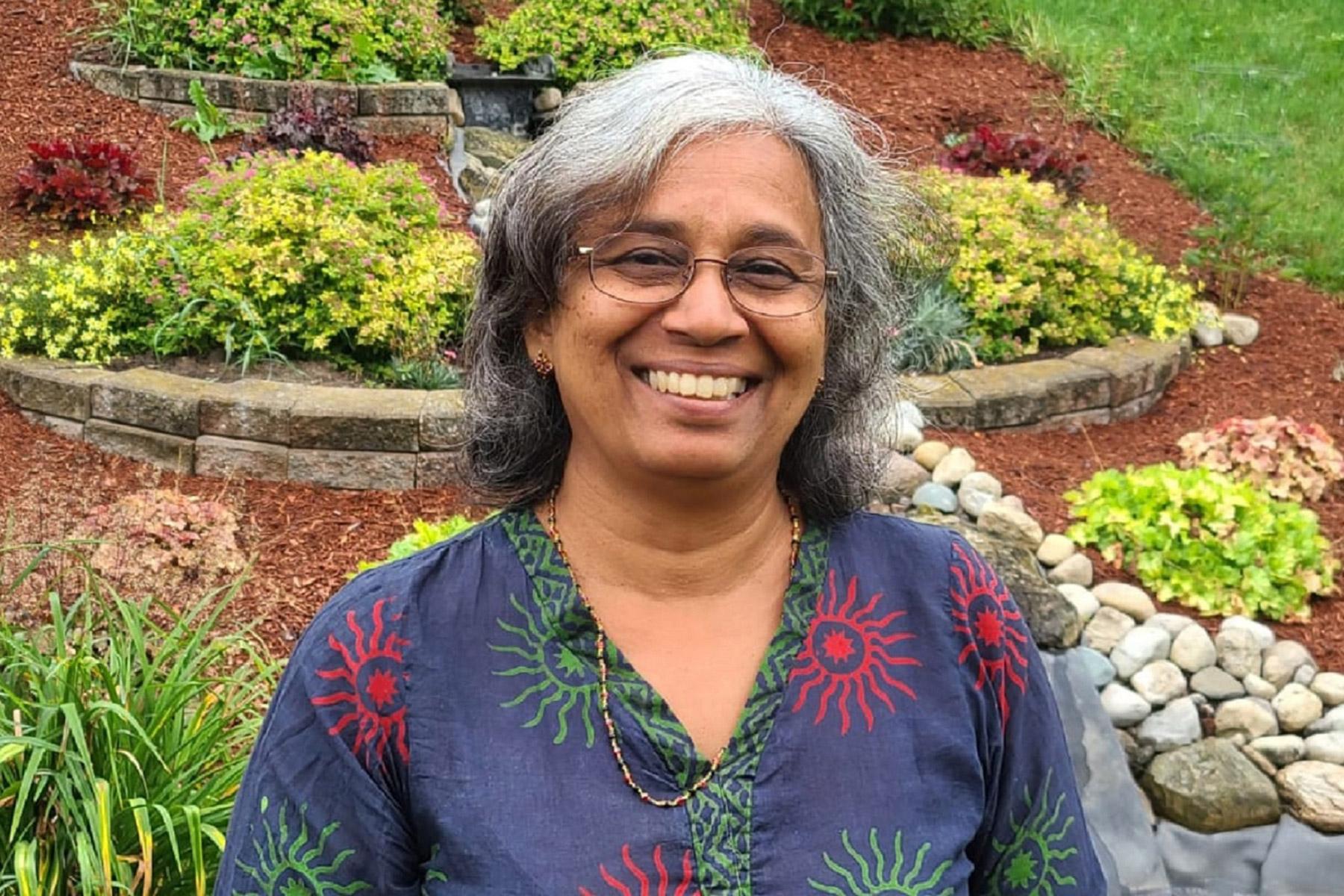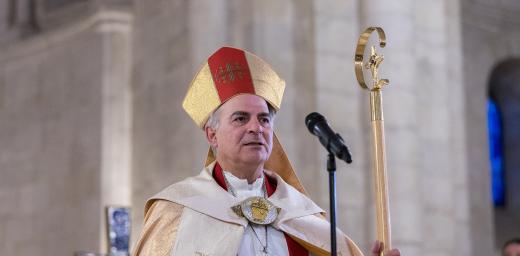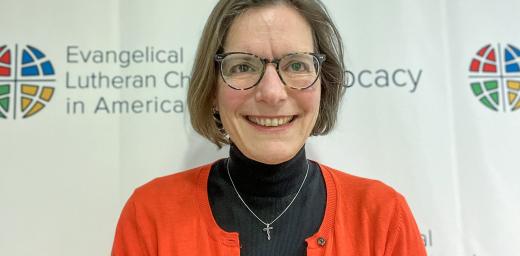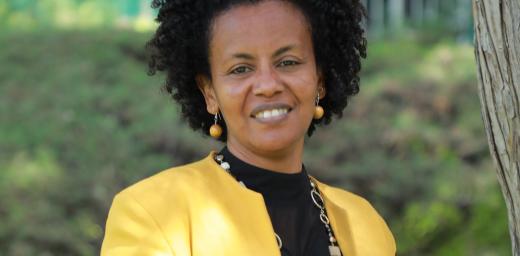Embracing sustainable practices and values

Mary Philip is Associate Professor for Lutheran Global Theology and Mission at the Martin Luther University College, Canada. One of her areas of expertise is Environmental Theology and Ecojustice. Photo: Mary Philip
Voices from the Communion: Dr. Mary Philip, Canada
(LWI) – “We cannot go back to what was normal,” says Mary Philip, Associate Professor for Lutheran Global Theology and Mission at the Martin Luther University College, Canada, as she looks back on the months since the outbreak of the Coronavirus disease (COVID-19) pandemic.
Days before the beginning of the 2020 Season of Creation with its theme “Jubilee for the Earth” she urges: “We have to put the brakes on, pause, and think: What have we been doing? If we are to have any future on this planet, we have to rethink, reimagine and re-story ourselves, and our relationships with each other and the earth that houses us.”
Philip is a trained zoologist and theologian. She was born in Saudi Arabia, calls India “home”, and currently teaches in Canada. “In the places I go, I try to represent the place that is in me,” she says. “I am a hybrid and so is my theology.”
In the latest issue of “Consensus – A Canadian Journal of Public Theology” of which you are editor-in-chief focuses on “Sustainability and Religion” and curates contributions to the interdisciplinary conference that took place in Bergen, Norway, in February this year. Could you describe the aim of this edition?
Climate change is the pivotal issue of the 21st century. The Lutheran World Federation (LWF) was clear in stating that climate change is not an abstract reality to the Lutheran communion of churches, and, sustainability is central to the issue of climate change. Sustainability is also the core of the United Nations’ Agenda 2030. The goal is to encourage development and progress while protecting the planet.
However, as was stated in the call for papers, sustainability is not merely a technical term, describing practices in the various sectors of the society but a concept that runs deep in the cosmologies and wisdom traditions of our faith. Our faith calls us to be active participants in the care of creation, and in the work towards a more just, sustainable and peaceful world.
This needs to be a way of life. All of us, regardless of the region and religion, have a role to play in equipping today’s generation to create pathways for sustainable living, and we have to educate ourselves as well.
In what ways does the topic of sustainability encourage cooperation between theologians, applied scientists, lawyers and political leaders?
The magic word is “interconnectedness.” Actually, it is not magic. It is the essence of being earthlings. We share one planet and are one humanity. The choice I make in one corner of the earth have consequences far and wide.
Achieving or striving to achieve sustainability in one area or one discipline will not solve the problem. It needs to happen everywhere, and everyone needs to play their part.
As I said earlier whether we are theologians, scientists, lawyers or political leaders, we share our concerns, and our common commitment to care for the earth from our respective traditions and disciplines. We cannot but explore ways to live together in such a way that my welfare comes not at the expense of another’s. Interdisciplinary dialogue around sustainability has the capacity to provide the space to explore ways to fostering ecological consciousness through education. No discipline is an island, whether it be theology, social sciences, jurisprudence or politics. They are interconnected!
John Donne said this in the 16th century, “No man is an Iland, intire of itselfe; every man is a peece of the Continent, a part of the maine; . . . any mans death diminishes me, because I am involved in Mankinde; And therefore never send to know for whom the bell tolls; It tolls for thee.” It still holds true. We are all in this together!
The conference took place just before internationally drastic measures were taken against the Coronavirus disease (COVID-19) pandemic. Looking back: How might the experiences made in the last months have influenced the discussions at the conference?
History has seen its share of pandemics – black death, small pox, cholera, Spanish flu, SARS, Ebola – some more devastating than others. COVID is the latest in the line and we are still nowhere to figuring out much about this pandemic.
However, what COVID did is to create a rupture, a crack, a much-needed pause.
I am not saying that the pandemic is a good thing. But, it forced us to stop doing things that were getting dangerously normal. While nature got a reprieve from the greedy humans, it also unveiled the many inequities in societies around the world. It is the poor and disenfranchised that are bearing the brunt of COVID.
When I hear the oft repeated question “when do we get back to normal” I want to scream out loud “NO.” We cannot go back to what was normal. We have to put the brakes on, pause, and think: What have we been doing? If we are to have any future on this planet, we have to rethink, reimagine and re-story ourselves, and our relationships with each other and the earth that houses us.
The words of activist Sonya Renee Taylor are pertinent here. “Our pre-corona existence was never normal other than we normalized greed, inequity, exhaustion, depletion, extraction, disconnection, confusion, rage, hoarding, hate and lack. . . We are being given the opportunity to stitch a new garment. One that fits all of humanity and nature.”
Or, as my compatriot Arundhati Roy would say, “Historically, pandemics have forced humans to break with the past and imagine their world anew. This one is no different. It is a portal, a gateway between one world and the next. We can choose to walk through it, dragging the carcasses of our prejudice and hatred, our avarice, our data banks and dead ideas, our dead rivers and smoky skies behind us. Or we can walk through lightly, with little luggage, ready to imagine another world. And ready to fight for it.”
I would like to think the discussions in the conference would take this into consideration and have our discourses in such a way that the COVID as much it was a threat could be a threshold as well. A threshold into a new and better world.
You are passionate about issues concerning women, climate change and eco-theology. How do these three aspects interrelate?
Climate change has gender-specific implications. Gender inequalities exist in most parts of the world, but climate induced disasters worsen the existing disparities. It is a fact that women are primarily the ones that have been caring for and preserving the earth.
However, women are more vulnerable to climate change because of the roles they have in society, especially in terms of production and domestic life. Thus, climate change disproportionately affects those that least contribute to it – women and children (and not to mention, the world’s poorest). In other words, women face eco-racism. Women are also susceptible to eco-anxiety as they are more affected by natural disasters again, because of their social role, poverty and gender inequity.
But like the lotus that blooms in the muddy waters, women resist and refuse to give in and instead become agents of change, of environmental and eco-justice. The UN Watch report on Gender and Climate shows women as having a strong body of knowledge and expertise that can be used in climate change mitigation. Women have an eco-sensitivity and eco-consciousness, and see the spirit of wisdom as the healing and life-giving force. They combine the sacred inherent in the natural world like trees, and plants and water with the understanding of Sophia, or wisdom thereby developing an eco-theology which undergirds their practice.
The Lutheran churches worldwide are involved in the discourses on climate change and sustainability in religion. We cannot but advocate for the increased participation of women in climate initiatives.
At Martin Luther University College you teach courses on eco-consciousness and the Earth Charter, among others. What is your observation: How well-established is eco-theology at universities and colleges worldwide?
Not as much as it should be. While eco-theology as such is not taught in universities, according to data collected by Times Higher Education (April 22, 2020), many universities worldwide are taking measures to educate students on climate change and sustainability, with Canada among the top five.
Educational institutions cannot but be engaged in discourses that question and challenge traditional perceptions of our relationships with the Earth and, by extension, our relationships with each other and the divine who we address in various names.
Universities and colleges need to inculcate in their students a new consciousness, an eco-consciousness or an earth consciousness that values the collective and not just the individual, that values connection and not separation, thereby redeeming our stories from those of dominion to stories of connectedness and restore the damage committed against peoples, places, plants, animals, mountains, rivers and oceans.
More importantly, educational institutions need to practice what they strive to teach their students. They too need to walk the talk that they are asking their students to walk and accept sustainable practices and values. The commitment to live out what they are inculcating in their structures, systems, processes, and modus operandi is crucial.
The Interdisciplinary Conference on “Sustainability and Climate in Religion” took place in Bergen, Norway, from 12 to 14 February 2020. It was a joint event of the Western Norway University of Applied Sciences, Church of Norway, Council for Religious and Life Stance Communities in Norway, Al Mowafaqa and the LWF. Consensus, Volume 41, Issue 1 (2020) curates contributions to the conference. One of them was made by Mary Philip, titled "Women, Climate Change and Eco-theology".
The Lutheran World Federation is a global body that shares the work and love of Christ in the world. In this series, we profile church leaders and staff as they discuss topical issues and set out ideas for building peace and justice in the world, ensuring the churches and communion grow in witness and strength.





